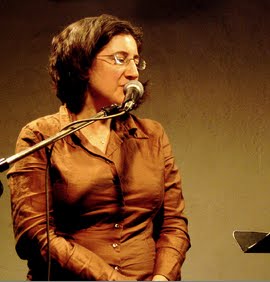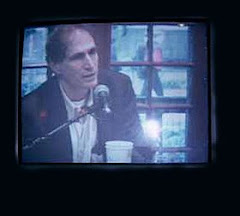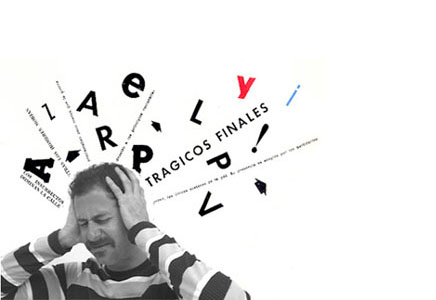 It's striking ... the way the title refers to the ballad form, a form that remains pointedly unrealized in the poem, of course. That itself, though, the ballad's unrealized form, and moreover its unrealizability in the present tense of the poem, is in part a commentary on the condition of a class that once, when there were astrolabes and lexicons, relied on it to narrate a fictional semblance of their lives. Now that the old ways of "geo-positioning" are gone, we have a flattening-out, as in "To Elsie" earlier in the century, we have a well-spoken man without a story of his trade and times, and we have a wife with only the barest skeleton of a narrative syntax for telling origin stories. Instead of a ballad we get fragments of a ballad-like theme (a poor lobsterman, who has bad teeth, and who has a wife, etc), and fragments of balladic devices (the repetition early on: "a poor lobsterman"). It's saying that once upon a time an anonymous ballad about a lobsterman might well have been told either by a poet or by the islanders themselves. The ballad is a public language both could have spoken, as each is interchangeably a speaker-listener.
It's striking ... the way the title refers to the ballad form, a form that remains pointedly unrealized in the poem, of course. That itself, though, the ballad's unrealized form, and moreover its unrealizability in the present tense of the poem, is in part a commentary on the condition of a class that once, when there were astrolabes and lexicons, relied on it to narrate a fictional semblance of their lives. Now that the old ways of "geo-positioning" are gone, we have a flattening-out, as in "To Elsie" earlier in the century, we have a well-spoken man without a story of his trade and times, and we have a wife with only the barest skeleton of a narrative syntax for telling origin stories. Instead of a ballad we get fragments of a ballad-like theme (a poor lobsterman, who has bad teeth, and who has a wife, etc), and fragments of balladic devices (the repetition early on: "a poor lobsterman"). It's saying that once upon a time an anonymous ballad about a lobsterman might well have been told either by a poet or by the islanders themselves. The ballad is a public language both could have spoken, as each is interchangeably a speaker-listener.
2/4/08
a public language both could have spoken
After listening to PT #3, Louis Cabri wrote us in response to Oppen's use of "Ballad" - not a "realized form" but nonetheless telling:
 It's striking ... the way the title refers to the ballad form, a form that remains pointedly unrealized in the poem, of course. That itself, though, the ballad's unrealized form, and moreover its unrealizability in the present tense of the poem, is in part a commentary on the condition of a class that once, when there were astrolabes and lexicons, relied on it to narrate a fictional semblance of their lives. Now that the old ways of "geo-positioning" are gone, we have a flattening-out, as in "To Elsie" earlier in the century, we have a well-spoken man without a story of his trade and times, and we have a wife with only the barest skeleton of a narrative syntax for telling origin stories. Instead of a ballad we get fragments of a ballad-like theme (a poor lobsterman, who has bad teeth, and who has a wife, etc), and fragments of balladic devices (the repetition early on: "a poor lobsterman"). It's saying that once upon a time an anonymous ballad about a lobsterman might well have been told either by a poet or by the islanders themselves. The ballad is a public language both could have spoken, as each is interchangeably a speaker-listener.
It's striking ... the way the title refers to the ballad form, a form that remains pointedly unrealized in the poem, of course. That itself, though, the ballad's unrealized form, and moreover its unrealizability in the present tense of the poem, is in part a commentary on the condition of a class that once, when there were astrolabes and lexicons, relied on it to narrate a fictional semblance of their lives. Now that the old ways of "geo-positioning" are gone, we have a flattening-out, as in "To Elsie" earlier in the century, we have a well-spoken man without a story of his trade and times, and we have a wife with only the barest skeleton of a narrative syntax for telling origin stories. Instead of a ballad we get fragments of a ballad-like theme (a poor lobsterman, who has bad teeth, and who has a wife, etc), and fragments of balladic devices (the repetition early on: "a poor lobsterman"). It's saying that once upon a time an anonymous ballad about a lobsterman might well have been told either by a poet or by the islanders themselves. The ballad is a public language both could have spoken, as each is interchangeably a speaker-listener.
 It's striking ... the way the title refers to the ballad form, a form that remains pointedly unrealized in the poem, of course. That itself, though, the ballad's unrealized form, and moreover its unrealizability in the present tense of the poem, is in part a commentary on the condition of a class that once, when there were astrolabes and lexicons, relied on it to narrate a fictional semblance of their lives. Now that the old ways of "geo-positioning" are gone, we have a flattening-out, as in "To Elsie" earlier in the century, we have a well-spoken man without a story of his trade and times, and we have a wife with only the barest skeleton of a narrative syntax for telling origin stories. Instead of a ballad we get fragments of a ballad-like theme (a poor lobsterman, who has bad teeth, and who has a wife, etc), and fragments of balladic devices (the repetition early on: "a poor lobsterman"). It's saying that once upon a time an anonymous ballad about a lobsterman might well have been told either by a poet or by the islanders themselves. The ballad is a public language both could have spoken, as each is interchangeably a speaker-listener.
It's striking ... the way the title refers to the ballad form, a form that remains pointedly unrealized in the poem, of course. That itself, though, the ballad's unrealized form, and moreover its unrealizability in the present tense of the poem, is in part a commentary on the condition of a class that once, when there were astrolabes and lexicons, relied on it to narrate a fictional semblance of their lives. Now that the old ways of "geo-positioning" are gone, we have a flattening-out, as in "To Elsie" earlier in the century, we have a well-spoken man without a story of his trade and times, and we have a wife with only the barest skeleton of a narrative syntax for telling origin stories. Instead of a ballad we get fragments of a ballad-like theme (a poor lobsterman, who has bad teeth, and who has a wife, etc), and fragments of balladic devices (the repetition early on: "a poor lobsterman"). It's saying that once upon a time an anonymous ballad about a lobsterman might well have been told either by a poet or by the islanders themselves. The ballad is a public language both could have spoken, as each is interchangeably a speaker-listener.
Subscribe to:
Post Comments (Atom)
























1 comment:
http://dedproductwrites.blogspot.com/
http://www.thedigitalword.com/poems_from_the_hood_davidson.html
http://www.redbubble.com/people/man5qts
http://www.anobii.com/people/dedproduct
Go Order The Poem Anthology, Great Book,Blog Tell Us What You Think
Thank You And Remember Writing Cures The soul!!!
Post a Comment